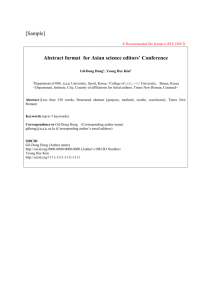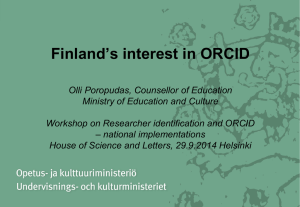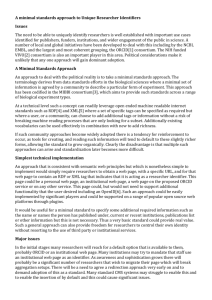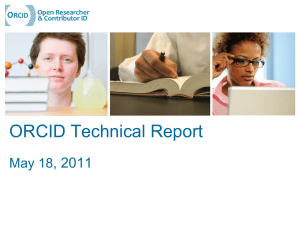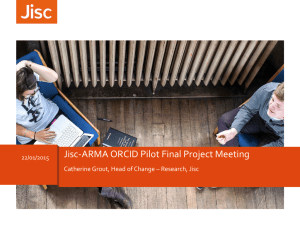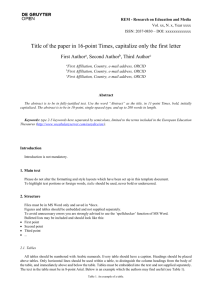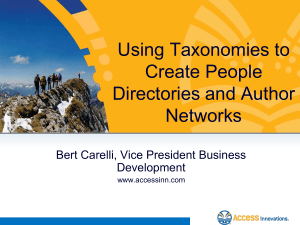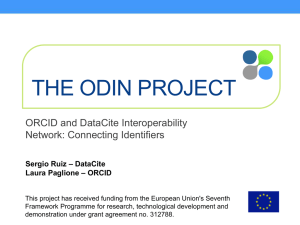ORCID Update & Other Researcher Identifiers
advertisement
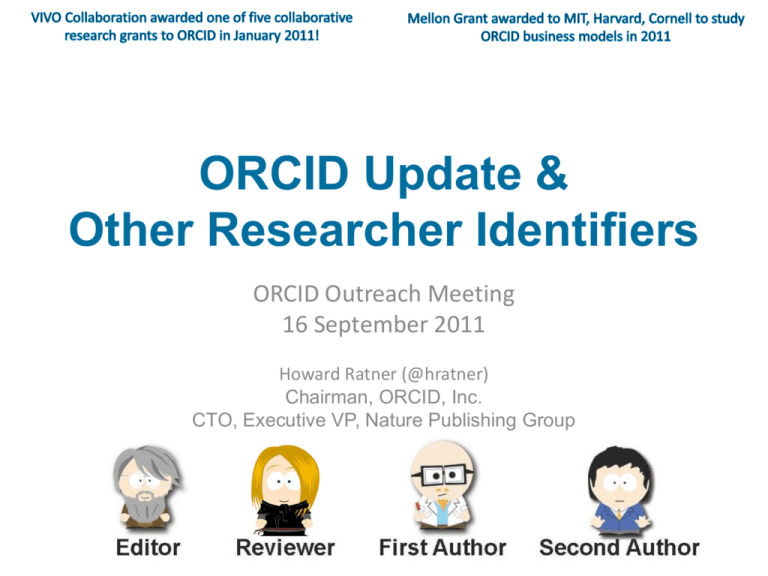
ORCID Update & Other Researcher Identifiers ORCID Outreach Meeting 16 September 2011 Howard Ratner (@hratner) Chairman, ORCID, Inc. CTO, Executive VP, Nature Publishing Group 10 Principles 1. ORCID will work to support the creation of a permanent, clear and unambiguous record of scholarly communication by enabling reliable attribution of authors and contributors. 2. ORCID will transcend discipline, geographic, national and institutional, boundaries. 3. Participation in ORCID is open to any organization that has an interest in scholarly communications. 4. Access to ORCID services will be based on transparent and non-discriminatory terms posted on the ORCID website. 5. Researchers will be able to create, edit, and maintain an ORCID ID and profile free of charge. 10 Principles 6. Researchers will control the defined privacy settings of their own ORCID profile data. 7. All profile data contributed to ORCID by researchers or claimed by them will be available in standard formats for free download (subject to the researchers' own privacy settings) that is updated once a year and released under the CC0 waiver. 8. All software developed by ORCID will be publicly released under an Open Source Software license approved by the Open Source Initiative. For the software it adopts, ORCID will prefer Open Source. 9. ORCID identifiers and profile data (subject to privacy settings) will be made available via a combination of “no charge” and “for a fee” APIs and services. Any fees will be set to ensure the sustainability of ORCID as a not-for-profit, charitable organization focused on the long-term persistence of the ORCID system. 10. ORCID will be governed by representatives from a broad cross-section of stakeholders, the majority of whom are not-for-profit, and will strive for maximal transparency by publicly posting summaries of all board meetings and annual financial reports. Key Constituents Why? Researcher Joins faculty Joins student body Helps track output of faculty and students Helps perform research assessment of grantees Applies for grant Submits Manuscript Streamline data input Creates author links - to publications - to collaborators - to other forms of communication 250+ Participants Newest Participants (Jun-Aug 2011) ORCID is open to any organization with an interest in scholarly communication ORCID transcends discipline, geographic, national and institutional boundaries 250 participating organizations as of 1 August 2011 Timeline 2010 Feb March April May June July Aug Sept Oct Nov Dec Build Sandbox Alpha Prototyping ORCID Members Demonstration and Alpha Testing Organization Creation Wellcome /MIT Survey Principles/Scope Defined Alpha Testing Profile Exchange Research & Development Timeline 2011-12 Q1 2011 Q2 2011 Q3 2011 Q4 2011 Q1 2012 Q2 2012 Q3 2012 Q4 2012 Build Phase 1 - Semantico Start Registering ORCIDs Build Phase 2 Sponsorship Drive 1 $244K Sponsorship Drive 2 $250 Goal VIVO Technology Research Mellon Marketing Research Profile Exchange Research & Development Staff Hired Start Collecting Fees Researcher Profile Updated ORCID<->DOI pairings submitted to ORCID Researcher Registers Author - ORCID – Publisher Interaction Metadata, along with ORCID deposited to CrossRef ORCID passed to manuscript submission system Content Published Manuscript processed Scope (ORCID phase 1 system) ORCID will build a central registry of unique identifiers for researchers and scholars with the following scope: – ORCID will focus on currently active researchers – Data will come from individuals and organizations – ORCID will be a hybrid system of self- and organization-asserted identity – Data collected will be those needed for disambiguation - extra data for optionally creating full CV-like profiles might be added in the future – System will provide basic matching and disambiguation of names – ORCID system will, from the start, enable 3rd parties to build value added services using ORCID infrastructure – ORCID services will be developed based on the needs of the ORCID community Self-asserted + socially-validated + organizationally-asserted identity = more credible assertion Self-Asserted Identity Socially-Validated Identity Disambiguated Identity Organizationally-Validated Identity Phase 1 Disambiguation Concept Assertion Collection Concept Trusted Linking Partners More Assertions = More Credibility Other Researcher ID Initiatives • Contributor ID (CrossRef) (http://www.crossref.org/CrossTech/2009/02/an_interview_about_author_ids.html) – prototype concept project of CrossRef whose learnings have been rolled into ORCID (general science) – CrossRef is an ORCID participant and board member • Scopus Author Identifier (http://help.scopus.com/robo/projects/schelp/h_autsrch_intro.htm) – standalone commercial service (general science) – Elsevier is an ORCID participant, board member, and Business and Technical Working Group member • ResearcherID (Thomson Reuters) (http://www.researcherid.com/) – standalone service that provided much of the basis for ORCID (general science) – T-R is an ORCID participant, board member, and Business and Technical Working Group member • RePeC (Research Papers in Economics) (http://www.repec.org) – standalone not-for-profit service (Economics) – RePeC is an ORCID participant and active Technical Working Group member • Names Project (http://names.mimas.ac.uk) – standalone not-for-profit project backed by JISC (UK government) – JISC is an ORCID participant and Technical Working Group member Other Researcher ID Initiatives • VIVO (http://www.vivo.org) – – – • ArXiv author identifiers (http://arxiv.org/help/author_identifiers) – – • – – separate initiative started by RROs for RROs. Identifies everything including fictional names and names of things (think boats) Supported by Proquest/Bowker ORCID is trying to find a way to engage with ISNI in a mutually beneficial way Lattes (http://lattes.cnpq.br/english) – – – – • standalone service (Physics) Cornell is an ORCID participant and board member International Standard Name Identifier (ISNI) (http://www.isni.org) – • NIH funded national network of scientists run by institutions. (Biomedicine) VIVO software installed locally and provides semantic web-compliant date into network ORCID participant and funder Used by Brazilian MCT [Science and Technology Ministry], FINEP [Projects and Studies Financing], CAPES/MEC [Personal Improvement Coordination/Ministry of Education], and all institutional actors, such as the Brazilian scientific community, as a curricular information system. (Brazilian Government) evaluation of competences of candidates to scholarships and/or research support selection of consultants, members of committees and advising groups VIVO participant and in discussions with ORCID Digital Author Identifier (DAI) – – http://www.surffoundation.nl/en/themas/openonderzoek/infrastructuur/Pages/digitalauthoridentifierdai.as px a new one! Not affiliated with ORCID Other Researcher ID Initiatives • Society Initiatives – – – – – ACM Digital Library AIP UniPhy American Chemical Society IEEE … • NLM PubMed Author Profile • Google Academic Profiles • Microsoft Academic Search More information found at Martin Fenner’s Blog: http://blogs.plos.org/mfenner/author-identifier-overview/ What Makes ORCID Different? • Only not-for-profit contributor identifier initiative dedicated to an open and global service focused on scholarly communication • ORCID is backed by a non-profit organization with over 250 participants behind it • ORCID is backed by many different stakeholders • Publishers are an important ORCID stakeholder but are just one part • ORCID is serious about building an open system • ORCID is the only researcher identifier that is not limited to discipline, institution or geographic area • ORCID is the one to bridge them all by registering the identifiers of all other relevant standalone services (silos big and small) Come Join Us Howard Ratner h.ratner@orcid.org Join us at www.orcid.org Follow us on Twitter @orcid
